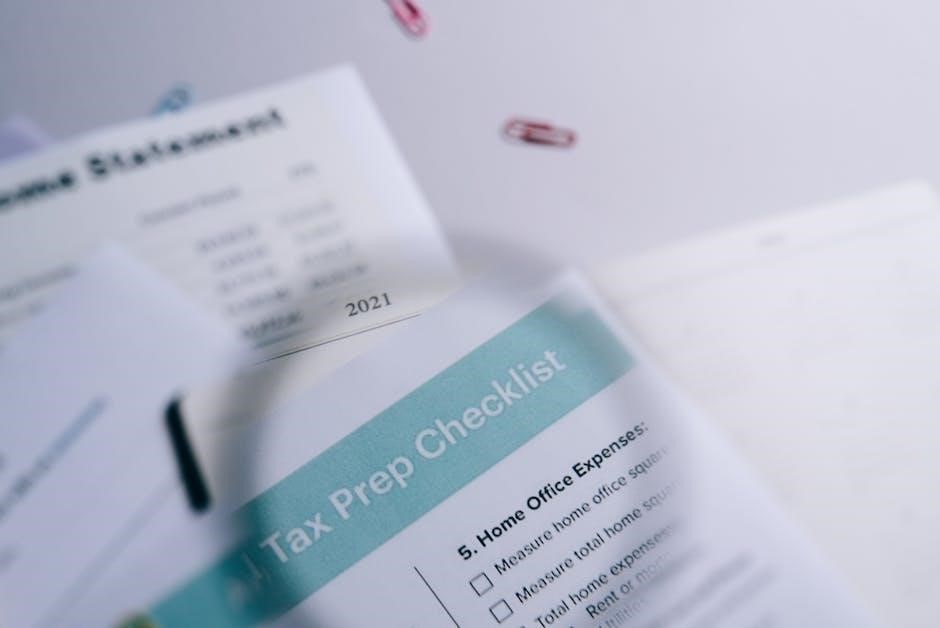A pre-divorce checklist is a valuable tool to ensure you’re prepared for the legal, financial, and emotional aspects of divorce. This comprehensive guide helps you organize essential tasks and documents, providing clarity and confidence throughout the process.
Why a Pre-Divorce Checklist is Essential
A pre-divorce checklist is crucial for ensuring preparedness and minimizing stress. It helps organize personal, financial, and legal details, preventing oversights. By securing documents and understanding responsibilities, individuals can make informed decisions. This tool streamlines the process, offering clarity and control during a challenging time. It also protects personal interests and ensures readiness for legal and financial changes, making the transition smoother and less overwhelming.
Gathering Personal Information
Collecting names, dates of birth, Social Security numbers, and children’s details ensures accuracy in legal documents. Organizing marital records and personal data avoids delays and complications.
Names and Dates of Birth
Gathering full legal names and dates of birth for both spouses and children is crucial for accuracy in legal documents. Include aliases or maiden names if applicable. This ensures all paperwork is correctly filed and avoids delays. Organizing this information in a checklist format helps maintain clarity and accessibility throughout the divorce process. Having these details readily available can significantly streamline the preparation of legal documents and court filings.
Social Security Numbers
Your Social Security number and your spouse’s are essential for legal documents and financial proceedings. Locate and verify these numbers to ensure accuracy. They are often required for asset division, credit checks, and court filings. Make copies of the Social Security cards for your records. This step helps prevent delays and ensures all paperwork is processed smoothly. Keep these documents secure to protect your personal information.
Children’s Information
Gathering details about your children is crucial for custody discussions and legal requirements. Include their full names, dates of birth, and any relevant custody arrangements. This information is essential for child support calculations and ensuring their well-being during the divorce process. Organizing these details helps in creating a fair and balanced plan for co-parenting and financial responsibilities. Accuracy is key to avoid delays or disputes in court proceedings.

Financial Preparation
Organize financial documents, assess income sources, and understand your overall financial situation. This step ensures clarity and preparedness for dividing assets and managing debts effectively.
Assessing Income Sources
Begin by identifying all income sources, including salaries, wages, bonuses, and any additional earnings. Gather recent pay stubs, tax returns, and W-2 forms to verify income accurately. This step is crucial for determining financial support and understanding each spouse’s contribution. It also helps in anticipating future financial needs and ensuring a fair division of resources. Organizing this information early streamlines negotiations and supports a smoother divorce process.
Listing Assets and Liabilities
Compile a detailed list of all marital assets, including real estate, bank accounts, investments, retirement accounts, and personal property. Note the approximate value of each asset. Similarly, list all liabilities, such as mortgages, loans, credit card balances, and other debts. Include account numbers and balances for clarity. This step ensures transparency and helps in achieving an equitable division of property during the divorce proceedings. Organize supporting documents, like deeds and statements, for verification.
Identifying Joint and Separate Debts
Distinguish between joint and separate debts to ensure clarity in the division of financial responsibilities. Joint debts, such as mortgages or credit cards held in both names, are typically considered marital liabilities. Separate debts, incurred before marriage or solely in one spouse’s name, may remain individual obligations. Make copies of loan statements, credit card balances, and agreements to document each debt’s status. This step ensures accurate division and protects your financial standing post-divorce. Consulting a divorce attorney can help navigate complex debt scenarios.
Legal Considerations
Legal considerations are crucial for a smooth divorce process. Understanding local laws, seeking professional advice, and ensuring all legal aspects are addressed can protect your rights and ensure a fair outcome.
Consulting a Divorce Attorney
Consulting a divorce attorney is a critical step in preparing for divorce. They provide legal guidance, protect your rights, and help navigate complex issues like custody and asset division.
An experienced attorney can offer tailored strategies, ensuring you understand your options and make informed decisions. Their expertise helps streamline the process and address potential challenges effectively.
Understanding Child Custody Options
Understanding child custody options is crucial for ensuring your children’s well-being during and after divorce. Legal custody determines decision-making rights, while physical custody governs living arrangements.
Courts prioritize the child’s best interests, considering factors like parental involvement and stability. A pre-divorce checklist helps prepare documentation and facilitates discussions with your attorney to explore custody scenarios and co-parenting strategies.
Grounds for Divorce
Understanding the legal grounds for divorce is essential for proceeding with your case. Common grounds include irreconcilable differences, adultery, or abandonment. Each jurisdiction has specific requirements, so reviewing local laws is crucial. A pre-divorce checklist ensures you document the grounds clearly, as this information must be stated in legal filings. Accuracy is key to avoid delays in the process. Consulting an attorney can help you navigate these requirements effectively.

Protecting Personal Interests
Protecting personal interests involves securing financial accounts, safeguarding valuables, and separating joint assets. Consulting a divorce attorney ensures your rights are protected throughout the process.
Securing Personal Belongings
Ensure personal belongings are safeguarded by making an inventory of items, securing them in a safe location, and documenting their condition. Consider storing valuable or sentimental items with a trusted friend, family member, or storage facility. Photograph or video record belongings for evidence, especially for items of significant value. This step helps prevent disputes and ensures your personal property is protected during the divorce process.
Protecting Credit and Financial Accounts
Monitor your credit report for accuracy and freeze joint accounts to prevent unauthorized changes. Close joint credit cards and open individual accounts to establish financial independence. Change passwords for online banking and investment accounts. Document all financial transactions and balances. Consider separating joint bank accounts and ensuring your name is on accounts you wish to retain. This helps safeguard your financial standing and prevents potential disputes during the divorce process.
Emotional and Psychological Preparation
Divorce can be emotionally draining. Seek support from friends, family, or a therapist to cope with stress and emotions. Prioritize self-care to maintain mental well-being.
Coping with Stress and Emotions
Divorce can trigger intense emotions, including sadness, anger, and anxiety. Lean on friends, family, or a therapist for support; Practice mindfulness, meditation, or journaling to manage stress. Setting boundaries and prioritizing self-care can help maintain emotional balance. Consider professional counseling to navigate feelings effectively and focus on healing during this challenging time.
Explaining the Situation to Children
When discussing divorce with children, use age-appropriate language to explain the situation honestly. Reassure them that both parents love them and will continue to care for them. Address their concerns about changes in routine and living arrangements. Encourage open communication and provide emotional support to help them process this transition. Maintaining stability and consistency can ease their adjustment to the new family dynamics.
Organizing Documents
Gather and categorize all marital documents, financial records, and property deeds. Ensure copies are made and securely stored for easy access during legal proceedings.
Marital Documents
Gather and organize all marital documents, including your marriage certificate, prenuptial or postnuptial agreements, and any property deeds. Locate wills, trusts, and powers of attorney. Ensure copies of these documents are secure and easily accessible for legal review. These records are crucial for establishing the foundation of your marriage and will be referenced throughout the divorce process. Organizing them early helps streamline negotiations and court proceedings.
Financial Records
Gather all financial records, including bank statements, tax returns, pay stubs, and retirement account information. Collect documents related to loans, credit cards, and mortgages. Include records of joint and individual accounts, as well as any investments or business financials. Organizing these records helps establish a clear understanding of your financial situation, which is crucial for equitable division during the divorce process. Ensure copies are secure and easily accessible for legal review.
Property and Asset Documents
Collect property deeds, vehicle titles, and real estate appraisals. Include documents for joint and separate assets, such as ownership details and mortgage statements. Gather insurance policies for homes, cars, and other valuables. Record purchase dates and current values of major assets. Organizing these documents ensures clarity in dividing property and assets during the divorce process. Secure copies of all records for legal review and equitable distribution.
Insurance Policies
Gather all insurance policies, including life, health, auto, and home insurance. Note coverage amounts, policy numbers, and beneficiaries. Determine who is covered under each policy and the premium payment details. Make copies of policy documents and store them securely. This ensures transparency and helps in understanding how policies may be divided or adjusted during the divorce process. Keep track of any changes to coverage before the divorce is finalized.

Creating a Post-Divorce Budget
Developing a post-divorce budget is crucial for financial stability. Start by evaluating your income sources, living expenses, and debts. Prioritize essential expenses like housing, utilities, and food. Consider future financial goals and adjust spending habits accordingly. Set aside funds for legal fees and potential lifestyle changes. Avoid financial oversights by carefully planning for post-divorce life, ensuring a smooth transition to independence. Regularly review and update your budget to adapt to new circumstances.
Understanding the Divorce Process
Understanding the divorce process involves filing the petition, serving papers, and attending hearings. Familiarize yourself with legal requirements, timelines, and procedures to navigate the process effectively.
Filing the Divorce Petition
Filing the divorce petition is the first legal step, requiring completion of court forms and submission to the appropriate jurisdiction. Ensure accuracy in details like names, dates, and grounds for divorce; Attach necessary documents, such as marriage certificates and pre-divorce checklists, to avoid delays. Consulting a lawyer can help ensure compliance with local laws and procedures. Proper filing sets the stage for the entire divorce process.
Serving the Divorce Papers
Serving the divorce papers is a critical step, ensuring legal notification to your spouse. Proper service typically involves a process server, law enforcement, or certified mail. Proof of service must be filed with the court to confirm delivery. Failure to serve papers correctly can delay the process. Ensure compliance with local court rules and deadlines to avoid complications. This step formally initiates the divorce proceedings and sets timelines for responses.
Attending Court Hearings
Attending court hearings is a mandatory part of the divorce process. Ensure you understand the date, time, and location of all scheduled hearings. Failure to attend may result in delays or unfavorable rulings. Organize all necessary documents and be prepared to present your case clearly. Understand the judge’s expectations and potential outcomes. Court hearings provide an opportunity to address disputes and finalize agreements, making your presence crucial for a fair resolution. Be punctual and well-prepared to ensure your rights are protected.

Avoiding Common Mistakes
Avoiding common mistakes in divorce requires careful planning and attention to detail. Overlooking financial disclosures, emotional decision-making, and failing to consult legal counsel can lead to unfavorable outcomes. A pre-divorce checklist helps ensure you address all critical areas, safeguarding your interests and streamlining the process.
Financial Oversights
Financial oversights can significantly impact divorce outcomes. Failing to disclose all assets, miscalculating income, or missing deadlines for financial submissions are common mistakes. Ensure accurate documentation of income sources, assets, and debts. Overlooking joint accounts or failing to secure credit can lead to financial loss. A pre-divorce checklist helps identify and address these issues, ensuring a fair division of resources and protecting your financial future. Attention to detail is crucial to avoid costly errors.
Legal Missteps
Legal missteps can delay or complicate the divorce process. Failing to properly serve papers, missing court deadlines, or neglecting to file necessary documents are common errors. Ignoring legal procedures or not understanding jurisdiction requirements can lead to case dismissal; A pre-divorce checklist ensures you follow all legal steps, avoiding costly delays. Consulting a lawyer and staying organized are key to navigating the process smoothly and avoiding potential legal pitfalls.
A pre-divorce checklist is an invaluable resource to streamline the divorce process, ensuring no critical steps are overlooked. By organizing personal, financial, and legal details, individuals can approach their divorce with confidence and clarity. Proper preparation reduces stress, avoids delays, and helps achieve a fair outcome. Use this checklist to safeguard your future and transition smoothly into the next chapter of your life with emotional and financial readiness.

